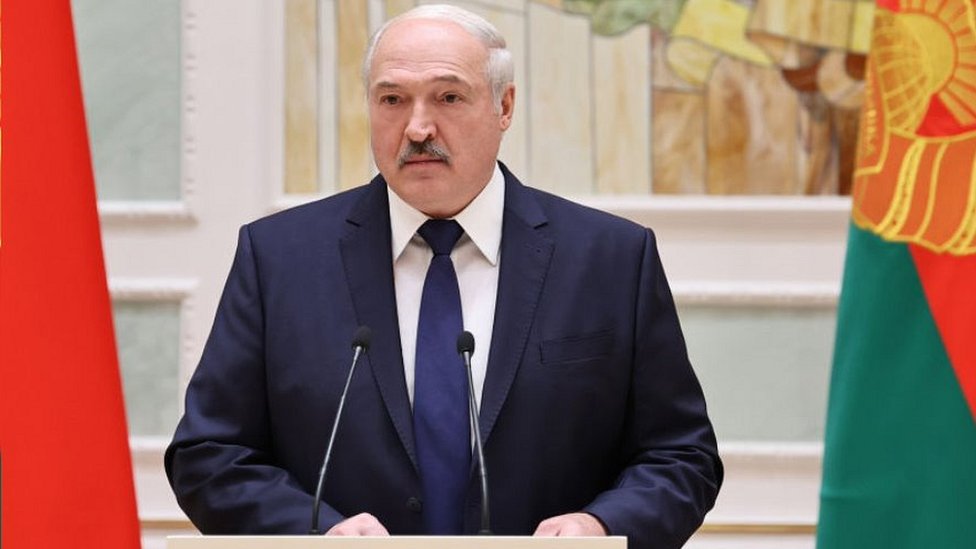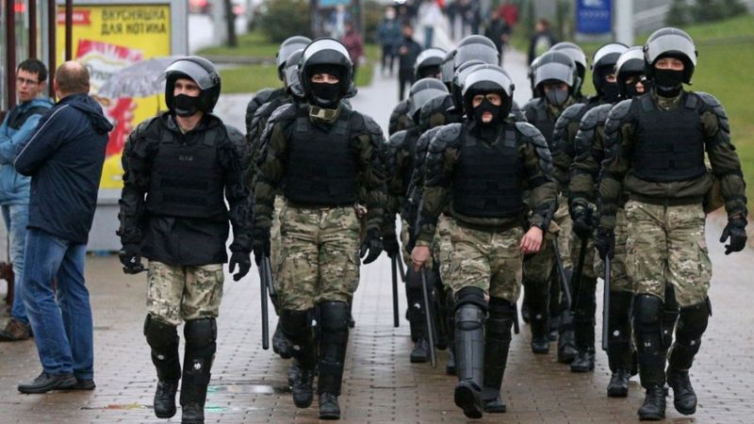The EU has added Belarusian leader Alexander Lukashenko and his son Viktor to its sanctions blacklist of Belarus officials, bringing the total to 59. The 15 added on Friday also include KGB secret police chief Ivan Tertel and President Lukashenko's chief of staff Igor Sergeenko.
The EU rejects Mr Lukashenko's claim to have won re-election on 9 August and deplores his crackdown on opponents. His son Viktor, 44, is a national security adviser.
Protests have swept the country since its long-time leader said he had won the vote, which was widely viewed as rigged. The main opposition leader, Svetlana Tikhanovskaya, said she had attracted between 60 to 70% of the vote and was forced into exile in neighbouring Lithuania immediately after the election.
The election-monitoring organisation, OSCE, said on Thursday that human rights abuses since the vote "were found to be massive and systematic and proven beyond doubt", and called for the official result handing Mr Lukashenko victory to be annulled "due to irregularities at all stages of the process".
UK Foreign Secretary Dominic Raab said the OSCE report had "exposed the fraud at the heart of the presidential elections" and he called for "new elections which are free and fair".
What the EU sanctions mean
The EU's latest sanctions block travel visas for the named officials and freeze any assets they may have in EU member states. In addition, EU citizens and companies are forbidden from lending to them.

The KGB police chief is accused of leading the state crackdown, involving "arbitrary arrests and ill‐treatment, including torture, of peaceful demonstrators as well as intimidation and violence against journalists".
The decision in principle to add Alexander Lukashenko and his son was made by EU foreign ministers on 12 October.
In September, the UK imposed sanctions on Alexander Lukashenko, his son and other senior Belarusian officials, under the UK's new human rights sanctions regime. The UK foreign secretary called Mr Lukashenko's actions "despicable".
Russian President Vladimir Putin however is backing Mr Lukashenko, reinforcing an alliance that goes back decades.
The Belarus opposition has organised huge demonstrations every Sunday since the election, usually with more than 100,000 people thronging the capital Minsk.
The EU and US government agree with the opposition that the August election was rigged, with brutality meted out to Mr Lukashenko's opponents.
The EU has told the Belarus authorities that they must stop the police violence and release those detained during weeks of mass protests, including all political prisoners.
Mr Lukashenko has ignored repeated opposition calls for negotiations to re-run the election under free and fair conditions, to end police brutality and release political prisoners.
Latest Stories
-
Implementation committee inaugurated for establishment of Kumawu Nursing and Midwifery College
23 minutes -
POJOBA congratulates Defence Minister Omane Boamah, extends invitation for June Speech Day
28 minutes -
Palestine pushes for full UN membership, urges African support amid genocide accusations against Israel
37 minutes -
‘Not the NDC’s legacy, it’s ours’ – NPP’s Haruna Mohammed on election review tradition
42 minutes -
‘Mahama’s incompetent government will fall in 2028’ – NPP vows comeback
1 hour -
Palestine seeks African solidarity against Israel’s invasion, draws parallels to Congo’s struggle
1 hour -
‘There will be cheaper and enhanced data bundles on 5 holidays this year’ – Sam George
2 hours -
‘Even NDC-owned radio stations weren’t spared’ – Sam George says suspensions were legal, not targeted
3 hours -
High Court fixes July 15 to commence Dram Oil, Deloitte and Touche trial
3 hours -
California becomes first state to sue over Trump tariffs
3 hours -
US government sues Maine over refusing to ban transgender athletes
3 hours -
US actress Michelle Trachtenberg died from diabetes complications
4 hours -
Bail extended to accused persons are free, don’t pay money – Judge cautions
4 hours -
Two suspects arrested in Asankragua aver attempted robbery
4 hours -
IT technician jailed 6 months for defrauding auto mechanic
4 hours

